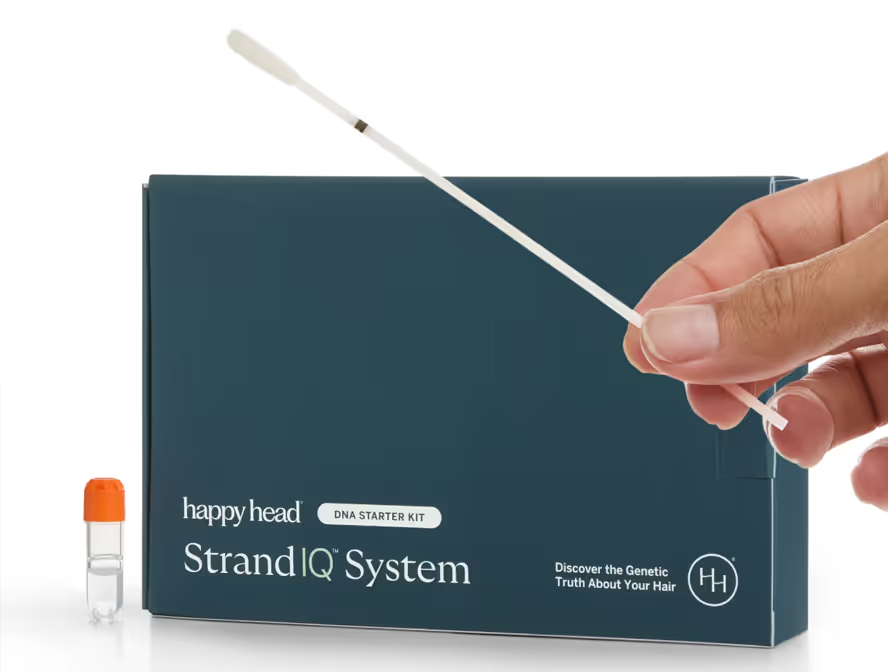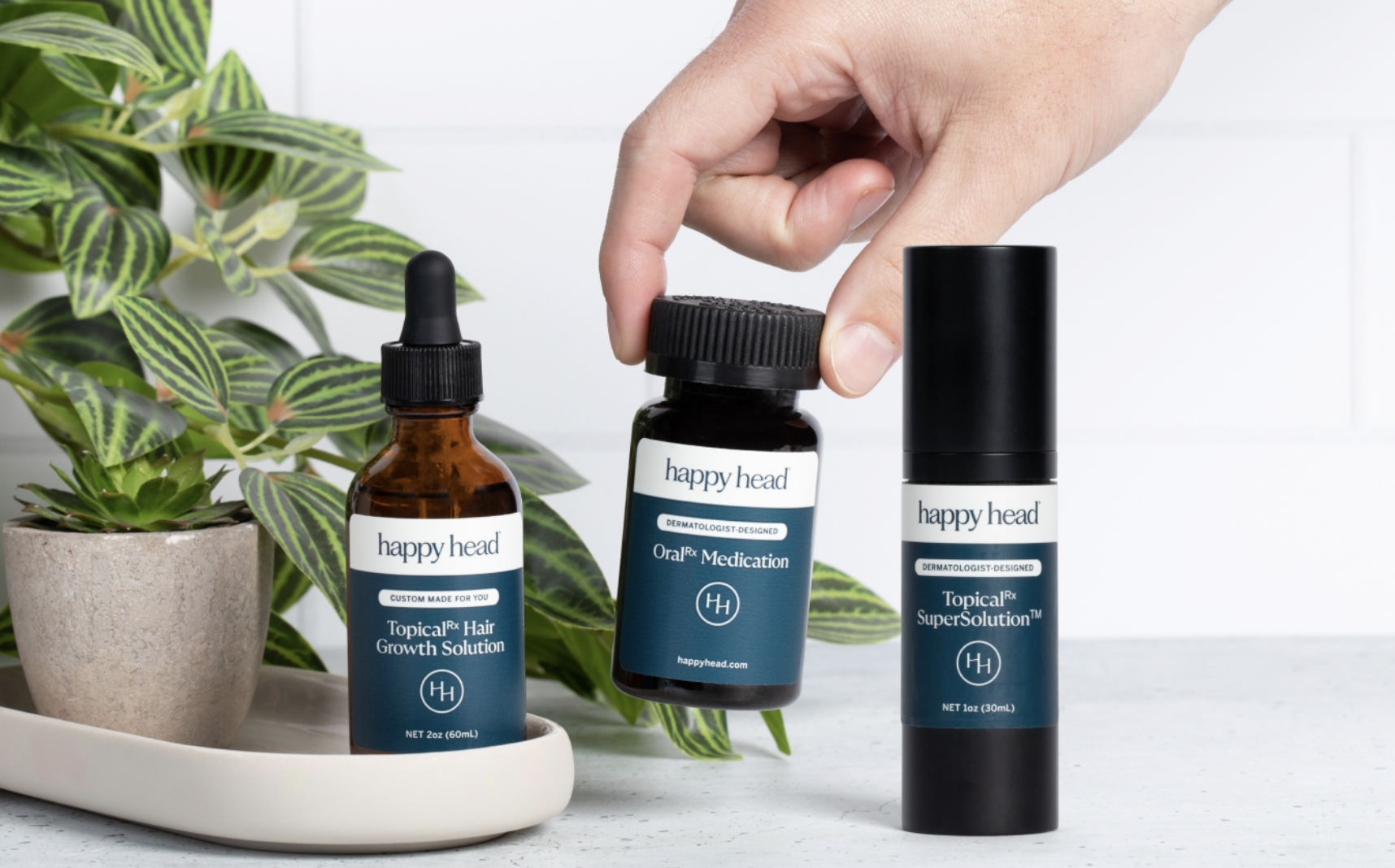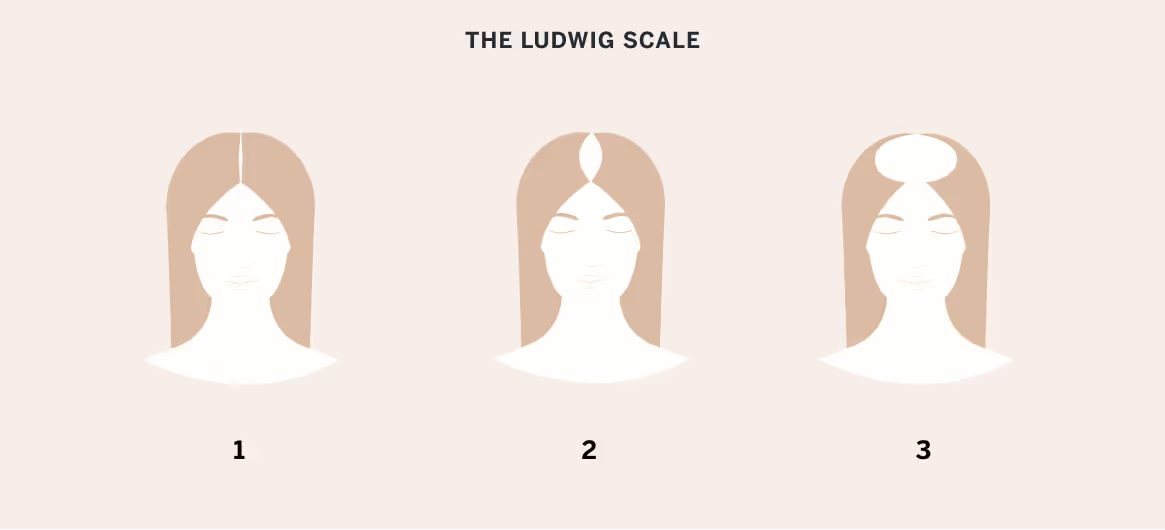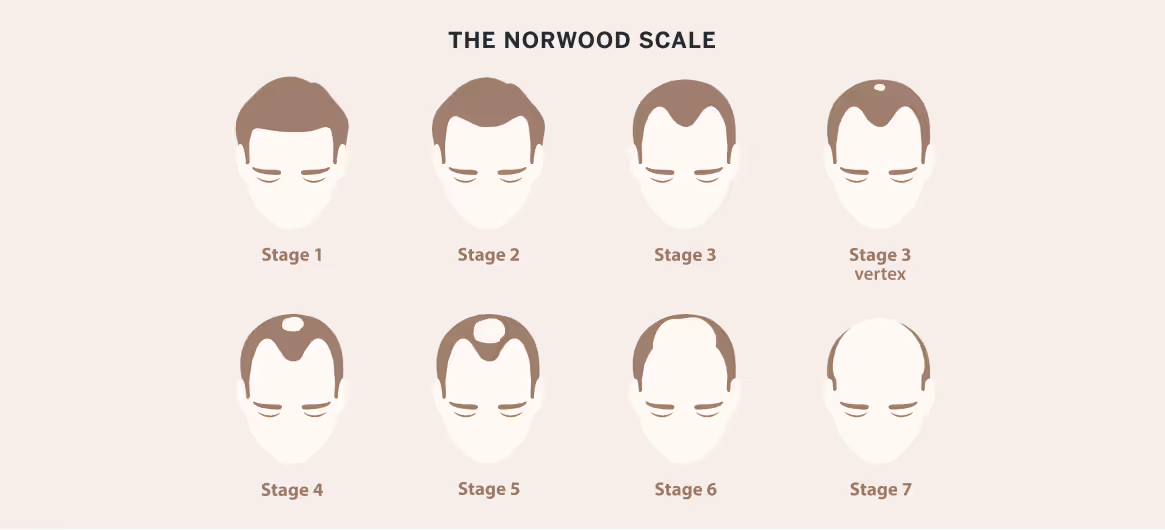Peptides for hair growth are gaining recognition as a promising option for individuals seeking non-hormonal, science-based hair restoration.
Unlike traditional treatments that focus solely on circulation or hormone regulation, peptides work by signaling the scalp to support healthier follicles, stronger strands, and reduced shedding.
Whether used alone or alongside established therapies, these targeted molecules can help rejuvenate thinning areas and improve scalp health at the cellular level.
As interest in regenerative hair treatments grows, understanding how peptides function—and how to choose the right product—is essential. In this guide, we’ll explore how peptides work, the most effective types, and what results you can realistically expect.
What Are Peptides for Hair Growth?
Peptides for hair are short chains of amino acids that act as biological messengers, signaling cells to perform specific functions related to hair health.
These compounds can mimic naturally occurring growth factors and influence the hair cycle by promoting follicular activity, improving blood flow to the scalp, extending the growth phase of the hair cycle, and supporting collagen production.
Unlike larger proteins, peptides can penetrate the skin more easily, making them effective in topical formulations. These tiny molecules work by signaling cells to produce more collagen, elastin, and keratin—key components of strong, resilient hair.
Various peptide types are designed to target different mechanisms of hair growth by reducing inflammation, enhancing cellular regeneration, or increasing nutrient delivery to follicles.
While peptides are still an emerging area in dermatology, they are increasingly used in hair restoration protocols, especially for patients seeking alternatives to traditional treatments.
How Peptides Work To Promote Hair Growth
Peptides support hair growth by targeting key biological pathways involved in follicle health and the hair cycle.
- They increase blood flow to the scalp, delivering more oxygen and nutrients to hair follicles.
- Peptides stimulate the dermal papilla cells, which help in regulating the hair growth cycle.
- Some peptides, such as GHK-Cu, bind to copper and activate genes responsible for tissue repair, angiogenesis, and anti-inflammatory effects.
- Others mimic natural growth factors that stimulate the anagen (growth) phase of hair follicles.
- Peptides can also help reduce DHT-induced miniaturization in androgenetic alopecia by modulating enzyme activity and improving scalp microcirculation.
- Peptides can help to strengthen the hair shaft by boosting the production of keratin, the protein that makes up the majority of your hair structure.
- Some peptides even have antioxidant properties that protect hair follicles from damage caused by free radicals and environmental stressors.
- Certain biomimetic peptides encourage stem cell activity in the hair bulge region, where follicular regeneration begins.
By influencing these pathways, peptides can promote thicker, healthier hair and potentially reactivate dormant follicles. Their multifunctional roles make them a valuable adjunct or alternative to established therapies such as minoxidil and finasteride solution.
Key Types of Peptides for Hair Growth
Peptides stimulate hair growth through cellular signaling, tissue repair, and follicle support. As research into peptide-based therapies advances, both topical and injectable formulations are emerging as promising tools in the fight against hair thinning and loss.
Understanding the different types of peptides and how they work can help patients and dermatologists make informed decisions about incorporating these bioactive compounds into treatment plans.
Biomimetic Peptides and Their Role in Hair Health
Biomimetic peptides are lab-engineered to replicate the effects of naturally occurring growth factors in the body. These peptides can stimulate dermal papilla cells, which play a central role in controlling the hair growth cycle.
By mimicking molecules such as IGF-1 (insulin-like growth factor) or VEGF (vascular endothelial growth factor), biomimetic peptides enhance cellular communication, boost microcirculation, and support keratinocyte function.
This activity promotes a prolonged anagen phase, encourages follicular regeneration, and strengthens the scalp’s structural matrix.
Biomimetic peptides are typically included in advanced serums or mesotherapy solutions and are especially useful for patients seeking non-hormonal, well-tolerated options.
Copper Peptides: Benefits and Mechanisms
Copper peptides, particularly GHK-Cu, are widely studied for their regenerative properties. These peptides bind with copper ions to activate pathways involved in wound healing, angiogenesis, and anti-inflammatory responses.
In the context of hair growth, copper peptides help extend the anagen phase, increase follicle size, and stimulate the production of extracellular matrix components such as collagen and elastin.
Copper peptides can help improve the overall health of the scalp. They have anti-inflammatory properties that can soothe irritation and reduce redness, making them a good choice for those with sensitive or dandruff-prone scalps.
Copper peptides help reduce oxidative stress and enhance vascularization around the follicles. They may also block DHT-induced damage, making them beneficial in cases of androgenetic alopecia.
Commonly found in topical serums or microneedling solutions, copper peptides are often used in conjunction with other therapies for enhanced efficacy.
GHK-Cu vs. Other Copper Peptides
GHK-Cu (glycyl-L-histidyl-L-lysine-copper) is the most studied and biologically active copper peptide for hair growth. It naturally occurs in the human body and has a well-established role in wound healing, tissue remodeling, and stem cell activation.
Compared to other copper peptides, GHK-Cu has a superior ability to bind copper ions and deliver them directly to the cellular environment, promoting DNA repair and hair follicle stimulation.
Other copper complexes may offer similar effects but often lack the bioavailability and proven safety profile of GHK-Cu.
While newer copper peptides are being developed, GHK-Cu remains the gold standard due to its multi-functionality, clinical history, and compatibility with both topical and injectable treatments.

Types of Peptide Hair Growth Products
Peptide-based hair products are available in various formulations, each designed to target hair growth through different delivery mechanisms.
- Topical serums are the most common and are applied directly to the scalp for localized absorption. Using a dermaroller for the scalp can enhance peptide penetration by creating microchannels in the skin.
- Injectables or mesotherapy formulations deliver peptides directly into the dermis, offering higher concentrations and faster results, though these must be administered by a licensed provider.
- Some shampoos and conditioners also contain peptides, but their efficacy may be limited by short contact time.
Happy Head’s Hair Serum features a powerful blend of peptides and other active ingredients designed to stimulate hair follicles and promote thicker, healthier hair.
Choosing the right formulation depends on hair loss severity, patient tolerance, and treatment goals. Combination approaches often yield the best outcomes.
Do Peptides Actually Work for Hair Growth?
Peptides can effectively support hair growth by stimulating cellular activity within the follicles, enhancing blood flow, and reducing inflammation in the scalp.
By promoting a longer anagen (growth) phase and improving follicle structure, peptides help increase hair density and thickness over time. Their ability to repair damaged tissue and support collagen production also contributes to a healthier scalp environment.
While individual responses vary, peptides are often a valuable option for patients seeking non-hormonal, multi-targeted approaches to hair restoration.

Peptides vs. Traditional Hair Loss Treatments
Peptides offer a targeted, natural approach to hair growth that sets them apart from traditional treatments.
Traditional treatments such as prescription minoxidil and low-level laser therapy (LLLT) improve blood flow and follicle size, making them effective for early-stage hair thinning in both men and women.
Prescription finasteride and prescription dutasteride are DHT blockers best suited for male-pattern hair loss, while spironolactone products are often prescribed for hormonal hair loss in women.
In contrast, peptides do not alter hormones but instead support follicle health through regenerative and anti-inflammatory pathways. They’re well-suited for patients with sensitive scalps, individuals with hormone concerns, or those seeking non-systemic options.
Peptides can complement other therapies or serve as a gentler alternative, especially for those unable to tolerate side effects from hormone-modulating drugs. Personalized combinations often yield the best results.
What To Look for When Choosing Peptides for Hair Growth
With a growing number of peptide-based hair products available, it’s essential to know what sets an effective formulation apart.
You should evaluate complementary ingredients and understand safety considerations before deciding on a particular product—choosing the right product can make a noticeable difference in results.
Important Ingredients To Pair With Peptides
For enhanced efficacy, peptides are often combined with ingredients that support hair follicle health.
Caffeine can improve circulation, while niacinamide strengthens the scalp barrier. Zinc and saw palmetto help reduce DHT activity. Hyaluronic acid improves hydration, aiding peptide absorption.
Look for antioxidant-rich components like vitamin E, green tea extract, and resveratrol, which protect follicles from oxidative stress.
These synergistic combinations optimize the scalp environment and amplify the regenerative effects of peptide-based treatments.
Safety and Side Effects of Peptide Hair Products
Peptide-based hair products are generally well tolerated, especially when used topically. They do not affect hormone levels, making them a low-risk option for both men and women.
However, mild irritation, redness, or itching can occur, especially if used with microneedling or on sensitive skin.
Always follow application guidelines and avoid combining with harsh ingredients such as alcohol-based solutions or strong retinoids unless directed by a dermatologist.
It's always a good idea to do a patch test before using a new product, especially if you have sensitive skin or a history of allergies.
How To Use Peptides for Hair Growth
Using peptide-based treatments correctly is essential for achieving visible improvements in hair thickness and density.
Application techniques, timing, and supporting practices can all influence your results. Whether using a topical serum or in-office therapy, consistency and proper scalp care are key to success.
Applying Peptide Serums and Treatments
Peptide serums should be applied directly to a clean, dry scalp—ideally at night when cell turnover is highest.
- Part the hair to expose thinning areas, and dispense the recommended amount using a dropper or applicator tip.
- Gently massage the serum into the scalp with your fingertips to promote absorption and circulation.
- Avoid washing your hair immediately afterward; give the product several hours to penetrate.
- When using microneedling or derma rollers to enhance delivery, ensure devices are sterile and pressure is gentle to avoid irritation.
For best results, follow the product’s directions and avoid combining with conflicting active ingredients unless advised by your dermatologist.
While you may start to see improvements in hair thickness and density within a few weeks, most people experience the most noticeable changes after 3–6 months of regular use. Stick with your peptide routine, and be patient as your hair follicles respond to the treatment.
Tips for Maximizing Results With Peptide Products
For optimal benefits, consistency is essential—daily use is typically recommended for topical peptide formulas.
- Make sure you're using a high-quality product that contains clinically proven peptides at effective concentrations.
- Pair treatments with a healthy scalp environment by using gentle, sulfate-free shampoos and avoiding buildup from heavy styling products.
- Incorporate complementary ingredients such as caffeine or niacinamide to support follicle function.
- Speak with a dermatologist about using minoxidil, finasteride, or natural extracts to complement your peptide treatments.
- Consider using a derma roller 1–2 times per week to enhance absorption.
- Avoid alcohol-based products that may dry or inflame the scalp, and give treatments at least 8–12 weeks before expecting visible results.
- Eat a balanced diet rich in protein, vitamins, and minerals to provide your hair with the nutrients it needs to grow strong and healthy.
- Managing stress, getting enough sleep, and staying hydrated can also help to optimize your results.
Peptides for Hair Growth: What To Expect
Peptides offer a gradual but meaningful improvement in hair health, especially when used consistently and in combination with a healthy scalp environment. Most users will not see noticeable changes during the first few weeks.
Around 8 to 12 weeks, you may observe less shedding, improved scalp condition, and subtle thickening in thinning areas. By 16 to 24 weeks, many patients experience visible increases in hair density and coverage.
Results vary based on the severity of hair loss, underlying causes, and whether peptides are used alone or as part of a broader treatment plan.
Unlike hormonal therapies, peptides work by stimulating follicle activity and improving scalp conditions, making them ideal for long-term maintenance. Ongoing use is generally needed to sustain results.
Who Might Not Benefit From Peptides
Peptides may not deliver strong results for individuals with advanced hair follicle miniaturization or scarring alopecia, where follicles are no longer viable.
They are also less effective if used inconsistently or without addressing contributing factors like hormonal imbalance, inflammation, or nutrient deficiencies. In such cases, a combined treatment plan may be necessary.
Are Peptides for Hair Growth Right for You?
If you’re experiencing thinning hair and want a gentle, non-hormonal option, peptides may be worth considering. Their ability to stimulate follicles, improve scalp health, and work alongside other treatments makes them a versatile solution for many types of hair loss.
While not a quick fix, peptides offer a targeted and science-backed approach that supports long-term hair restoration without systemic side effects. As with any treatment, it’s important to align your strategy with your specific hair loss type and goals.
Consulting a dermatologist can help determine whether you’re a good candidate and provide guidance on combining therapies for optimal results. If you’re seeking a modern, multi-pathway solution, peptides for hair growth may be the right step forward.
Talk to a board-certified dermatologist to discuss your goals and find the solution that is best for you.
Frequently Asked Questions
Do peptides really work for hair growth?
Yes, certain peptides, especially copper peptides and biomimetic peptides, can stimulate hair follicles, extend the growth phase (anagen), and support scalp health. Peptides have shown promise in improving hair density and thickness over time, though results will vary.
Does BPC-157 regrow hair?
BPC-157 is a synthetic peptide known for promoting healing and reducing inflammation, but evidence for hair regrowth is mostly anecdotal. Unlike peptides designed specifically for hair growth, BPC-157 lacks strong clinical data supporting its use for this purpose.
Are peptides better than minoxidil for hair growth?
Peptides and minoxidil work through different mechanisms. Minoxidil boosts blood flow and follicle size, while peptides support follicle health and cell signaling. Peptides may complement minoxidil but are not necessarily more effective as a standalone option.
What is the best injectable peptide for hair growth?
GHK-Cu is considered one of the best injectable peptides for hair growth due to its strong anti-inflammatory, regenerative, and follicle-stimulating properties. However, injectable peptides should only be administered by licensed professionals.












